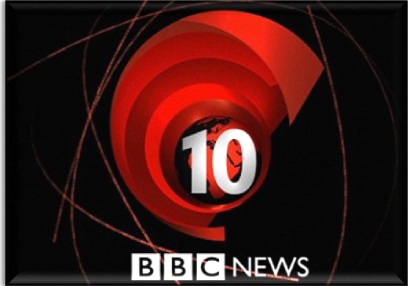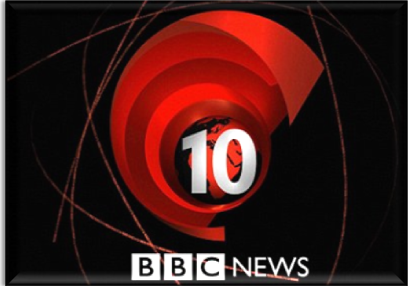‘One Woman Expert for every Nine Men’ on its Flagship News Bulletin
Published 19 July 2012
For the Daily Mail

 The BBC has been accused of being ‘testosterone-fuelled’ after nine times as many male experts than women were shown on its flagship nightly news bulletin. Nearly all the interviewees appearing on the BBC’s Ten O’clock News were male, according to researchers. The study, carried out over a week, found there was a night last month when only one woman featured on the programme ‘in any capacity at all’ – and she was on for only seconds.Last night, critics questioned whether the BBC was even making an effort to reflect Britain’s gender balance, saying it was either ‘lazy’ or ‘playing it safe’. Researchers from City University London carried out the study for industry magazine Broadcast.
The BBC has been accused of being ‘testosterone-fuelled’ after nine times as many male experts than women were shown on its flagship nightly news bulletin. Nearly all the interviewees appearing on the BBC’s Ten O’clock News were male, according to researchers. The study, carried out over a week, found there was a night last month when only one woman featured on the programme ‘in any capacity at all’ – and she was on for only seconds.Last night, critics questioned whether the BBC was even making an effort to reflect Britain’s gender balance, saying it was either ‘lazy’ or ‘playing it safe’. Researchers from City University London carried out the study for industry magazine Broadcast.
Anti-discrimination campaigner Miriam O’Reilly said she was not surprised. She said: ‘I saw the news on June 13. I was actually shouting at the screen “Where are the women?”’ Miss O’Reilly, who won an ageism case against the BBC after she was removed from Countryfile, added: ‘I don’t know whether they are playing it safe or being lazy.’
A BBC News spokesman said: ‘We do take the issue seriously and are working to improve the gender balance, although the BBC cannot dictate who organisations put forward for interview.’
The Ten O’clock News compared badly with rival shows. While it could only manage one in ten women as experts, for Channel 4 News it was three to one in favour of men and four to one on Newsnight. The BBC1 show’s main rival, ITV’s News At Ten, was shown to have a ratio of five men to every women when it came to expert guests.
Writing for Broadcast, Lis Howell director of broadcasting at the university, said even for broader topics such as gay marriage, male interviewees were used ‘for every aspect of the story’. The academic said: ‘Never mind women experts – there weren’t any UK women at all.
‘Our monitor noted that within the 27-minute programme, the only woman to feature appeared in an item about the Egyptian elections. How ironic is that?’
‘On a British news programme, the only woman who made it on air was an Egyptian in a gym – a vox pop at that.
‘Is it really likely that no women did anything of significance or had anything to say, in the whole UK, on that day? Even the most intransigent male elitist would have to admit that it bizarre.’
Miss Howell said that because women journalists often appeared on the programme, such as Stephanie Flanders, as well as presenters Sophie Raworth and Fiona Bruce, there was an impression women were being fairly represented.
The research monitored the use of women on the Ten O’Clock News between Tuesday June 12 and Monday June 18. The other shows were measured between Monday, June 11 to Friday June 15.
In her article she said the ‘extravagant’ amount of time given to sport was part of the problem. According to the research sport was responsible for between three and four minutes of most editions of the news programme in the week being measured. Politics was found to have averaged about five minutes per night.
The research also revealed that the only Ten O’Clock News ‘package’ with more women than men in during the week was about poor families in Greece. Miss Howell said: ‘Stereotypes from the BBC? Perish the thought.’
The monitoring found that Channel 4 ‘gets the prize’ for best use of female experts. As well as guests like Theresa May it also used women to contribute to general stories.
The findings come after earlier this year director general Mark Thompson said there are not enough older women on television. He admitted the corporation had a ‘case to answer’ over the lack of female presenters – especially in ‘iconic roles’ and there were ‘manifestly too few older women broadcasting on the BBC’.
Mr Thompson added there were simply not enough women in ‘key news and current affairs presenting roles’, singling out the ‘big political interviews’. He had said that while economics editor Stephanie Flanders is ‘outstanding’ there are too few women among the most senior on-air specialist journalists.
In recent years, respected figures such as Anna Ford, Selina Scott, Kate Adie, Dame Joan Bakewell and many others have spoken out about their concerns over the treatment of older women by all broadcasters. In recent months this has broadened out to include the shortage of women as experts and contributors on news programmes.
To read more, click here
